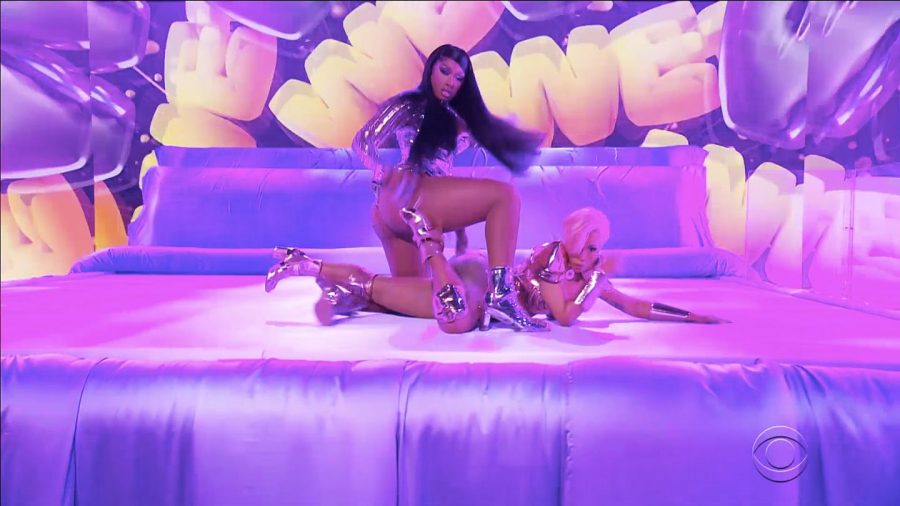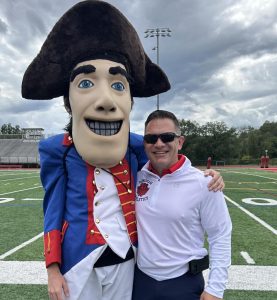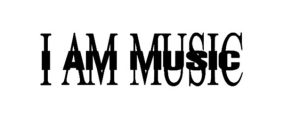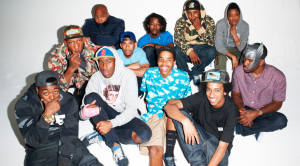There Are No More Rules
March 26, 2021
This is an opinion article piece. Ana Clara Monaco is a sophmore at Mendham who writes for Global & Domestic News. All opinions expressed in the following editorial are her own and do not necessarily reflect the views of The Patriot.
Perhaps the most astounding arc of societal progression is that of American television and its shift in standards of decorum. The loose language and norms of the 21st century have rapidly seeped into the entertainment media, facilitating a transition from the censured, conservative content of the past to its current unfiltered nature. Elvis Presley immediately comes to mind, as he accumulated fame among the 1950 American youth population for his unconventional style and approach to music yet was criticized for these same attributes by older generations. He was one of the first who sought to disrupt the status quo, although in a seemingly harmless manner. Media served the purpose of entertainment, education, or persuasion– all of which required some form of censorship and professionalism. There existed an unspoken rule of basic decency that protected viewers and preserved the sanctity of the media. Now, this rule has grown ambiguous. There are fewer and fewer standards that preside over media content, growing from the integration of explicit language to the normalization of nude scenes and the subsequent removal of any limitations or censors.
Anyone who watched the Grammy Awards this month likely found two aspects to be the most memorable: Billie Eilish’s humble acceptance speech and the controversial performance of “WAP” by Cardi B and Megan Thee Stallion. I have considered how to describe the latter in a manner appropriate for a school platform, but have found the task to be impossible. The meaning of the song, the visuals of the performance, the attire of the artists: every single aspect of the Grammy segment is inappropriate for both a school paper and for a late-night award show. Host Trevor Noah even had to warn the audience before the song began, saying “If you have small children in the room, just tell them it’s a song about giving a cat a bath.” The performance has garnered criticism and applause as the public struggled to comprehend the images that played on their screen; some praised the women for the unconventional nature of the show, while others shamed both the artists and CBS network for confounding “empowerment with debasement.”
Five years ago, shows like iCarly and Spongebob were sources of extreme concern and disapproval by parents, for reasons that ranged from excessive to understandable: a lack of good role models/positive messages and the use of mean dialogue, flirting, and God’s name in vain. The lack of control over external environments and real-life interactions likely caused parents to be cautious when regulating their child’s media intake, as was the case with my mother. My sister and I, ages 11 and 8 respectively, had outgrown the shows featured on Disney Junior (Dora the Explorer, Mickey Mouse Clubhouse, Octonauts, etc.) and had proudly graduated to the “big cheese”: namely, Wizards of Waverly Place, Dog with a Blog, iCarly, Lab Rats. As was arguably the largest difference between these types of shows, the latter included teenage rebellion, controversial language, and yelling– the last of which turned out to be the final straw in my family. After witnessing a particularly loud episode of iCarly, my mother instantly prohibited us from watching, a decision that I now understand to be accredited to the impressionable nature of young children.
The Grammys, of course, is a whole different story. It falls into the intermediate category, where the content is geared towards adults but normally suitable for children. As time slots largely determine the audience and content of on-air shows, the 8 p.m. exhibition places it at a time when children are likely to be in front of the television. Save some harmless jokes and questionable dance moves, the content is not something most parents shield from their children– as the majority of those aspects go right over their heads. Given the platform and nature of the event – a formal, prestigious awards ceremony broadcasted on the prominent channel CBS – who would think that a featured performance would include half-naked women gallivanting around a pole and engaging in obscenely explicit gestures?
Now, I’m not conservative on any accounts. I believe in female empowerment and freedom of expression, whether in its implementation in school dress codes or the treatment of celebrities. I do not think, however, that Cardi B and Megan Thee Stallion’s performance fell into either of these categories, but into another that had no place on the Grammy stage and was entirely unfit for a primetime network television broadcast. There is a difference between empowerment and degradation, between freedom of expression and distasteful displays. My issue lies with the platform on which they chose to express themselves and the loss of standards their performance revealed.
Nudity and sexual innuendos are now common in television but are always differentiated by the R rating. I think the lack of censorship in entertainment media has allowed for positive repercussions: heightened awareness of social issues, greater creative license for directors, the widening of representation and opportunities provided by television. But, similar to the difference between Octonauts and iCarly, there need to be boundaries that divide the entertainment from its extreme. By allowing such chaos and vulgarity to stain the Grammy stage, this boundary is rapidly disappearing and, with it, any chance for preserving the innocence of younger generations. The “WAP” song was barely recognizable through the small pauses or lyric changes that concealed the countless explicit language: shouldn’t that, at least, have been any indication of the song’s impropriety for the occasion?










